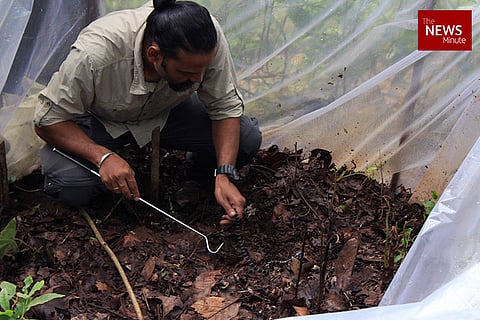

It was in the last week of April 2017 that Vijay Neelakandan, a wildlife photographer and conservationist, received a call to rescue a King Cobra spotted in a cashew plantation in Kottiyoor of Kannur district.
In May, he arrived at the spot to assist the Forest Department Rapid Response Force Team member, Chandran MP, and forest officials for the task. While inspecting the plantation of Mathews Velikakath, the team spotted the nest of a King Cobra. They came to know that earlier, the villagers burnt a similar nest which was built by the snake.
Here begins the story of how three men guarded around 20 to 30 eggs of a king cobra for about a 100 days, to ensure that they hatch, because the snake that had laid the eggs had gone missing.

“That will be the most treasured sight of my life. The most precious one in the 30 years of my wildlife career,” says Vijay.
“The nest was about 1.5 feet high, beautifully woven using leaves and weaves. It was built in the shade of a tree, and even when it rained, not one drop would go inside. She (snake) laid her eggs in such a way that she ensured nothing would happen to them,” Vijay explains.
He says that in their inspection, they found soft white eggs inside the nest. They assumed that the snake might have laid eggs in the last week of April when it was first spotted by the villagers. That is how they calculated that they would hatch by the end of July, or the beginning of August, since snake eggs take 85 to 105 days to hatch.

The next task for him was to convince the scared villagers as well as the plantation owner to let them hatch in the plantation itself.
“We spoke to people, even the forest officials helped. Through the panchayat and through other local people, we somehow convinced the residents. But the real hero was Mathews, because ultimately, it was his decision to allow us to do it in his plantation,” Vijay says.
MP Chandran and Vijay along with other forest officials prepared a plan to conserve the eggs as well as to help them hatch safely. They restricted movement of people in the area, regularly inspected the place even at night for five to six hours. They also placed cameras to keep an eye on the area.

Gowri Shankar and Vijay Neelakantan
“We also kept on checking the humidity, rain and other temperature variance in the area. We kept away from the nest as much as possible, so that we did not hinder its habitat. We never touched the eggs, we just made sure that they were safe. We also checked whether any fungus has infected the eggs,” Vijay says.
Vijay also invited his friend and renowned herpetologist - King cobra expert Gowri Shankar - to join them and to have an expert intervention to this rescue mission. “If the mother snake was with the eggs, she would have taken care of all these things,” Vijay said.

They fenced the nest without affecting it. After 75 days, the three member team stayed in the plantation to have a 24-hour vigilance to ensure undisturbed natural incubation of eggs.
“That was the proudest moment for all of us, we had achieved what we set out to,” Vijay says, adding that even the villagers were thrilled when the eggs hatched.
Though villagers said that there were around 25 eggs, Vijay was not ready to reveal the exact number. “I will not tell the number. Let it be confidential, because otherwise, it would create a fear in the minds of the public. They were scared right at the beginning.”

The newborn snakes were left into the forest.
“This can also be an inspiration for wildlife conservation. May be this is a first incident in Kerala where humans protected snake eggs till they hatched,” an excited Vijay shares.

He also said that Protection of the Earth’s biological riches is the duty of each and every citizen, suggesting that there should be facilities to research in these areas for protecting and rescuing wildlife.
Photos : Vijay Neelakantan, Kalinga Centre for Rainforest Ecology, Agumbe